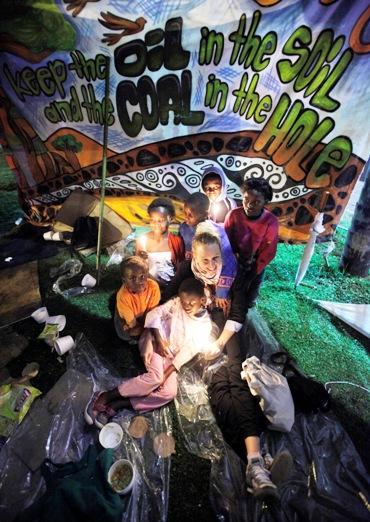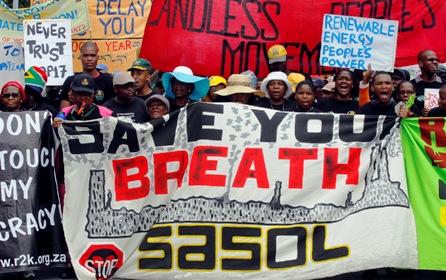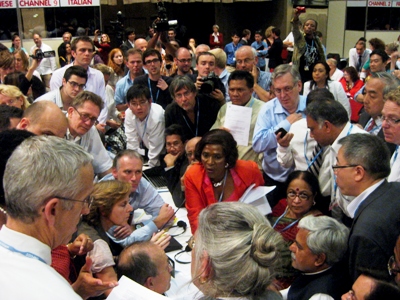Photographs: Mike Hutchings/Reuters BS Reporter & Agencies in New Delhi
After two weeks of parleys, an impassioned speech by environment minister Jayanthi Natarjan and 36 hours of marathon negotiations, Durban finally managed to deliver a breakthrough by giving Kyoto Protocol, the only legally binding climate treaty, a second lease of life.
The United Nations climate talks on Sunday okayed the road map for a 2015 accord.
The accord will, for the first time, legally bind all major carbon polluters to cut greenhouse gas emissions.
. . .
Durban climate deal sealed, mixed outcome for India
Image: Man on a unicycle takes part in a demonstration by environmental activists outside the United Nations Climate Change conference in Durban.Photographs: Mike Hutchings/Reuters
Just when commentators had given up on Durban, the conference of parties salvaged the talks and came up with major decisions in the last hour, including the extension of Kyoto Protocol, operationalisation of the much-needed green climate fund and a new legally binding treaty.
Extension of the existing protocol and inclusion of 'equity' in future talks could be considered a victory trophy for India, which stood its ground amid global criticism for being a 'deal breaker'.
India's proposal on equity has already been included in the work plan for the next conference.
. . .
Durban climate deal sealed, mixed outcome for India
Image: Environmental activist holds up a sign during a demonstration.Photographs: Mike Hutchings/Reuters
In the last round of negotiations, Natarajan and the EU were the key actors.
The minister refused to relent under pressure and made a bold statement that 'India will never be intimidated by threats or intimidation.'
She found support in China.
Though the Kyoto decision was cheered, the accord on the legally binding future commitment evoked a mixed response from Natarajan, the Indian industry and NGOs.
The future treaty will legally force all major carbon polluters to cut greenhouse gas emissions.
. . .
Durban climate deal sealed, mixed outcome for India
Image: Environmental activists demonstrate outside the United Nations Climate Change conference.Photographs: Mike Hutchings/Reuters
Kyoto Protocol sets binding targets for 37 industrialised nations and the European Union to slash carbon emissions to five per cent below the 1990 levels by 2012.
Until now, China and India have been exempt from any constraints because they are developing countries, while the US has opted out of the Kyoto Protocol.
India had earlier argued that mandatory cuts would slow the growth of developing nations.
After their talks, India and the EU agreed to the compromise formula, with Natarajan saying, "We have shown our flexibility and we have agreed to this. . ."
. . .
Durban climate deal sealed, mixed outcome for India
Image: Ministers gather in a huddle where agreement was reached to extend the Kyoto Protocol during a plenary session at COP17 in Durban.Photographs: Reuters
"We are not sure about the shape of the future legally binding treaty and what kind of responsibility would be vested in the developed and developing countries," said Rita Roy Choudhury, director, environment and climate change at Federation of Indian Chambers of Commerce and Industry.
Even as the industry and countries debate over the fine print, experts feel the pledges to cut emissions both from developed and developing countries are not high enough to keep the global average temperature rise below two degrees Celsius.
The next major United Nations Framework Convention on Climate Change climate change conference will take place in Qatar in December, 2012.







article